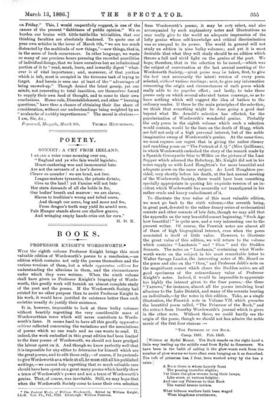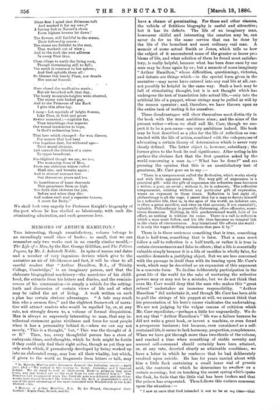BOOKS.
PROFESSOR KNIGHT'S WORDSWORTH.*
WITH the eighth volume Professor Knight brings this most valuable edition of Wordsworth's poems to a conclusion,—an edition which contains not only the poems themselves and the various versions of them, but a whole apparatus critic us for understanding the allusions in them, and the circumstances under which they were written. When the ninth volume shall have given us Professor Knight's biography of Words- worth, this goodly work will furnish an almost complete study of the poet and the poems. If the Wordsworth Society had existed for no other purpose than to assist Professor Knight in his work, it would have justified its existence better than such societies usually do justify their existence.
It is, however, impossible to look at these bulky volumes without heartily regretting the very considerable mass of Wordssvorthian verse which will never contribute to Words- worth's fame. It seems hard to have all this goodly apparatus criticus collected concerning the variations and the associations of poems which no one reads and no one wants to read. If, indeed, the work embodied in this great edition had been limited to the finer poems of Wordsworth, we should not have grudged the labour spent on it. And though we know perfectly well that it is impossible for airy editor to determine for himself which are the great poems, and to edit those only,—of course, if he pretends to give Wordsworth as a whole at all, he must edit all his published writings,—we cannot help regretting that so much valuable care should have been spent on a great many poems which hardly show a trace of Wordsworth's power and not a trace of Wordsworth's genius. That, of course, was inevitable. Still, we may hope that when the Wordsworth Society come to issue their own selection • Tits Poetical Works of William Wordsworth. Edited by William Knight, LL.D. Vols. VI., VII., VIII. Edinbargh William Petersen. from Wordsworth's poems, it may be very select, and also
accompanied by such explanatory notes and illustrations as may really give to the world an adequate impression of the lofty genius whose self-knowledge and critical discrimination was so unequal to its power. The world in general will not study an edition in nine bulky volumes; and yet it is most desirable that what they will study should be an edition which throws a fall and vivid Hat on the genius of the poet. We hope, therefore, that in the selection to be issued,—which was the subject of conversation at the last annual meeting of the Wordsworth Society,—great pains may be taken, first, to give
the best (not necessarily the latest) version of every poem selected, without various readings ; next, to give any information concerning the origin and circumstances of each poem which really adds to its popular effect ; and lastly, to take those
poems only on which several educated tastes converge, so as to have nothing which will suggest the idea of bathos to the
ordinary reader. If these be the main principles of the selection, we think that something might be done going a good deal beyond what Mr. Arnold's selection has effected, for the
popularisation of Wordworth's wonderful genius. Probably the only poem in the eighth volume which such a selection would contain, would be the lines on the death of Hogg, which are full not only of a high personal interest, but of the noble imaginative sweep of Wordsworth's genius. At the same time, we must express our regret that in giving the rather clumsy and rambling poem on "The Portrait of J. Q." (Miss Quillinan), in which Wordsworth embodied the story of the remark made by a Spanish Gerouymite friar to Wilkie on the picture of the Last Supper which adorned the Refectory, Mr. Knight did not in his notes supply us with Lord Houghton's far more beautiful and adequate poem on the same subject. As Lord Houghton pre- sided, very shortly before his death, at the last annual meeting
of the Wordsworth Society, there would have been something specially appropriate in quoting his exquisite version of an in- cident which Wordsworth has assuredly not transfigured in his rather crude and heavy embodiment of it.
To illustrate the true value of this most valuable edition, we must go back to the sixth volume,—the seventh being, in great part, devoted to the rather dreary series of ecclesiastical sonnets and other sonnets of late date, though we may add that the appendix on the very beautiful sonnet beginning, "Such Age how beautiful! " is quite new, and a very interesting one to the present writer. Of course, the Fenwick notes are almost all of them of high biographical interest, even when the poem annotated is itself of little value. However, to illustrate the great value of this edition, we will return to the volume which contains " Laodamia " and " Dion " and the Dnddon Sonnets. The notes on" Laodamia," containing what Words- worth wrote on the subject in his most remarkable letter to Walter Savage Landor, the interesting notes of Mr. Heard on the poem and also on the "Dion," and Professor Jebb's note on the magnificent sonnet which closes the Duddon series, are all good specimens of the extraordinary value of Professor Knight's notes. Indeed, it would be impossible to appreciate too highly the interest given to the finer poems,—the three "Yarrows," for instance, almost all the poems involving local allusions to the Lake District, and many of the sonnets bearing on individuals,—by the notes in this edition. Take, as a single illustration, the Fenwick note in Volume VII. which precedes the beautiful poem called, "The Primrose of the Rock," and the extract from Dorothy Wordsworth's journal which is given in the other note. Without these, we could hardly see the origin of the poem, though we should not less admire the noble music of the first four stanzas :—
" TuE PRIMEOEE 01 THE ROcit. Comp. 1831. Pub. 1835.
[Written at Rydal Mount. The Rock stands on the right hand a little way leading up the middle road from Rydal to Grasmere. We have been in the habit of calling it the glow-worm rook from the number of glow-worms we have often seen banging on it as described. The tuft of primrose has, I fear, been washed away by the boa y rains.] Roca there is whose homely front The passing traveller slights; Yet there the glow-worms hang their lamps, Like stars, at various heights : And one coy Primrose to that Rock The vernal breeze invites.
What hideous warfare hath been waged What kingdoms overthrown,
Since drat I spied that Primrose-tuft
And marked it for my own ;* A lasting link in Nature's chain
From highest heaven let down !
The flowers, still faithful to the stems, Their fellowship renew : The stems are faithful to the root, That worketh oat of view ; And to the rock the root adheres In every fibre true.
Close clings to earth the living rook, Though threatening still to fall ; The earth is constant to her sphere ; And God upholds them all : So blooms this lonely Plant, nor dreads Her annual funeral.
Here closed the meditative strain ; But air breathed soft that day, The hoary mountain-heights were cheered, The sunny vale looked gay, And to the Primrose of the Rock I give this after-lay.
I sang—Let myriads of bright flowers, Like Thee, in field and grove Revive unenvied ;—mightier far, Than tremblings that reprove Our vernal tendencies to hope, Is God's redeeming love; That love which changed--for wan disease, For sorrow that had bent
O'er hopeless dust, for withered age—
Their moral element, And turned the thistles of a curse To types beneficent.
Sin-blighted though we are, we too,
The reasoning Sons of Men, From one oblivious winter called
Shall rise, and breathe again ; And in eternal summer lose Our threescore years and ten.
To humbleness of heart descends This prescience from on high, The faith that elevates the just, Before and when they die; And makes each soul a separate heaven, A court for Deity."
We shall look very eagerly for Professor Knight's biography of the poet whom he has studied so laboriously, with such dis- criminating admiration, and such generous love.







































 Previous page
Previous page